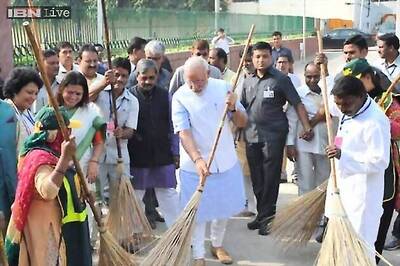
views
THIRUVANANTHAPURAM: Melancholic and extravagant the sound waves often were, but they never missed to elicit applause. Radio drama not only made good for the visual element, but was the most-favoured entertainment in the antediluvian age when sop operas on television had not yet laid siege of hearts. At the Regional Training Institute (RIT) of All-India Radio, Vazhuthacaud, this month’s sessions, titled ‘Re-discovering radio drama’, were dedicated to chalking out a revival plan for the genre that is facing a serious threat of extinction. And heading the team of enthusiasts who had come on board from stations in Karnataka, Tamil Nadu and Kerala was Station Director, AIR/Doordarshan, Bangalore, G M Shirahatti, a name to reckon with in Kannada theatre. “We are looking at the possibilities of revamping the genre of radio drama. It is an art form that is unique to radio and needs an exclusive production style. Almost any other item broadcast on radio can be borrowed from another medium, for instance, a speech or songs or even the voice-over of a movie. But, radio drama has to be planned and produced exclusively for this broadcast medium,” Shirahatti explained, adding that the radio itself was a dramatic medium because of the element of drama in the communication. The team of over sixteen participants, from stations such as Chennai, Bangalore, Puducherry, Kozhikode, Madurai, Coorg, Thrissur and Thiruvananthapuram, had already made commendable innovations in their capacity as programme executives to save the antiquated genre from falling out of favour, Shirahatti added. “If the public service broadcasting organisation, which AIR is, stops producing radio dramas, the genre will die out in due course since none of the private broadcasters take interest in it,” said K A Muraleedharan, Station Director, AIR Thiruvananthapuram. The five-day workshop, from June 13 to June 17, is part of the monthly training programmes organised at the Training Institute. “The Thiruvananthapuram RIT caters to the training requirements of Kerala, Karnataka and Tamil Nadu and has a consistent schedule that often has two training sessions in a month,” said S Radhakrishnan, Programme Executive, RIT. “As a public service broadcasting organisation, we aim to groom our staff to the tune of the demands raised by private players. So our training programmes, evolved for various strata of the staff, look at broadcasting, programme production and management. Reviving the broadcasting of programmes unique to AIR is one of the thrust areas of RIT,’’ he added.



















Comments
0 comment